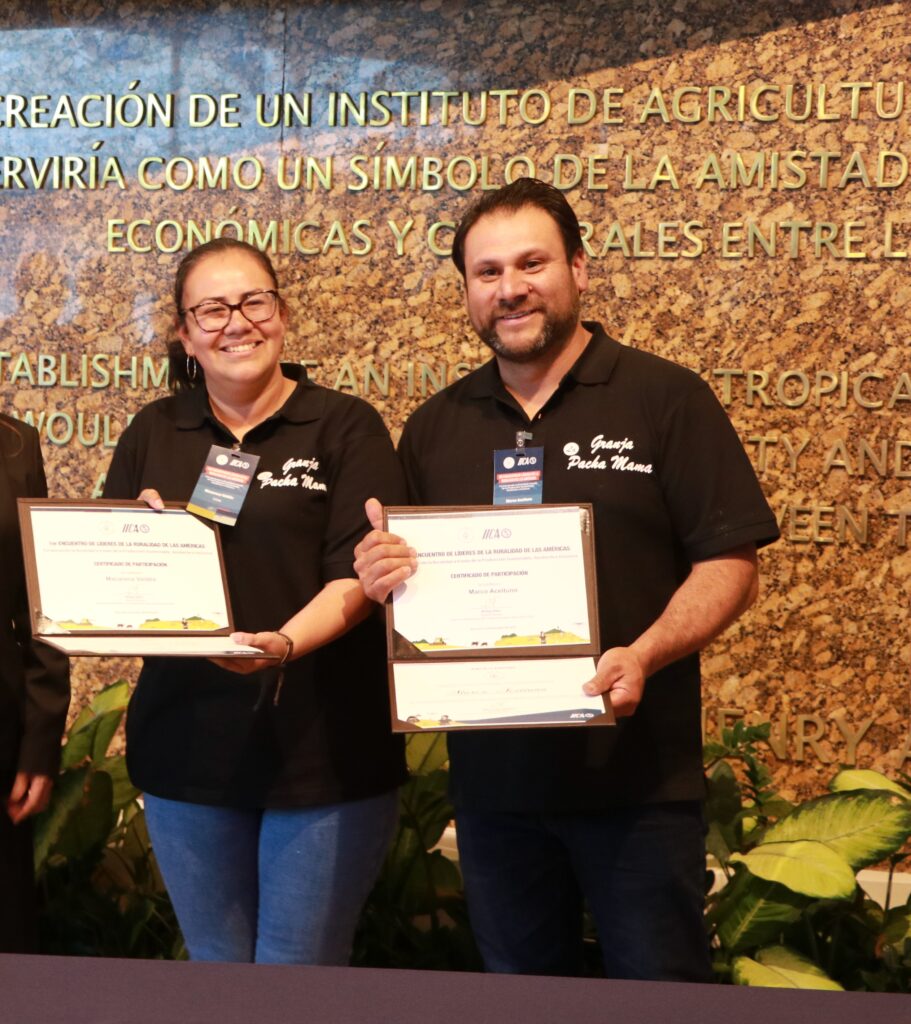
Brasilia, 16 September 2025 (IICA) – Macarena Valdés and Marco Aceituno, creators of a farm where food production has flourished despite the severe drought that has afflicted Chile in recent years, will be among the speakers at the Conference of Ministers of Agriculture of the Americas 2025, to be held from November 3 to 5 in Brasília.
The couple, who have succeeded in producing food with limited resources by applying circular economy techniques, will travel to the Brazilian capital at the invitation of the Inter-American Institute for Cooperation on Agriculture (IICA).
“As a family, we have high expectations. We want to tell the ministers how we’ve managed to produce and survive under adverse climate conditions”, explained Marco and Macarena, founders and owners of La Pachamama Farm, a productive venture on a hillside in Los Molles, in Chile’s central Valparaíso region, where they live with their three children.
The Conference, organized by the Government of Brazil together with IICA, will be a high-level forum where ministers and senior agricultural officials from across the continent will discuss key issues for the present and future of agriculture in the Americas. They will also debate how to deepen the ongoing transformations, with science, technology, and innovation playing a central role.
Finding solutions
Marco Aceituno and Macarena Valdés have been recognized as Leaders of Rurality of the Americas—an honor awarded by IICA to men and women who make a lasting impact and a difference in rural areas across the Americas, which are essential for global food and nutrition security and environmental sustainability. The award seeks to highlight their ability to inspire positive examples and strengthen ties to rural life.
“Although adverse climate conditions and water scarcity are a challenge for many farmers across the continent today, we’re convinced that solutions can be found. We’ve lived on this hillside for many years, having moved here from the city without prior knowledge of agriculture, and this forced us to look for alternatives to survive”, they explained.
At La Pachamama Farm, Marco and Macarena focus on making the most of available resources, including reusing water. This approach gave rise to an agroecological garden where they grow the food they eat and produce a surplus to sell or trade with neighbors. The farm is equipped with solar panels to generate electricity and a biodigester that converts organic animal waste into biogas.

The Conference, organized by the Government of Brazil together with IICA, will be a high-level forum where ministers and senior agricultural officials from across the continent will discuss key issues for the present and future of agriculture in the Americas.
All the water used for irrigation in one crop is reused for others. Through a drip irrigation system, the water seeps through the soil and is collected at the end of the process in a bucket, now enriched with nutrients, to be used again for other vegetables. In their organic garden, they grow potatoes, onions, carrots, bell peppers, tomatoes and all the vegetables and fruits their family consumes.
“The recognition as Leaders of Rurality given to us by IICA has opened doors we never dreamed of”, said Macarena and Marco. “Today, at our La Pachamama Farm, we receive a growing number of small farmers who want to exchange ideas with us to continue producing food, even under difficult conditions”.
Brazil’s Minister of Agriculture, Livestock and Food Supply, Carlos Fávaro, will open the Conference in Brasília together with IICA Director General Manuel Otero. In addition to presentations by special guests, the event will also include technical discussion forums among ministers and country delegations, with the participation of representatives from private-sector companies and organizations.
More information:
Institutional Communication Division.
comunicacion.institucional@iica.int











